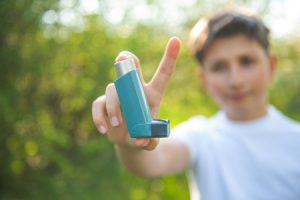
Have Asthma? What You Should Know…
Asthma is a common respiratory ailment affecting both children and adults. Characterized by shortness of breath and constriction of the airways, it can be pretty stressful for those experiencing an asthma attack. Luckily, individuals can easily manage the condition with fast-acting prescription medication, most commonly administered via an inhaler.
However, one of the often-overlooked aspects of asthma is its effects on teeth and oral health. In several ways, both the nature of the condition and the preferred treatment options can harm saliva production.
A dry mouth is bad news for teeth.
Saliva for your teeth is like oil for your engine. It keeps everything lubricated and protected. When saliva dries out, teeth are more exposed to the air and decay-causing bacteria. This dry mouth and decay can lead to a cascading effect of bad breath (AKA halitosis), periodontal disease, etc.
So how does asthma cause all this?
Asthma medications (like many prescription and over-the-counter drugs) can cause dry mouth as one of the primary side effects. Of course, this is a small price to pay instead of struggling to breathe, but it’s a factor that inhaler-users should recognize and monitor. Inhalers can also disrupt the balance of bacteria and other microorganisms in the mouth, leading to oral thrush. Oral thrush is a fungal infection characterized by white patches or lesions on the tongue, inner cheek, or other soft tissues.
Additionally, due to the nature of the condition and the struggle to breathe it causes, those who have asthma may engage in mouth breathing. This breathing style naturally leads to a dryer condition for the mouth and teeth.
For all these reasons, we encourage those with asthma to ensure they have an excellent at-home regimen to maintain their oral health. Be sure to include all your relevant asthma information (including medications) on your health history form, and we’ll be happy to discuss additional options to assist your efforts at home.
